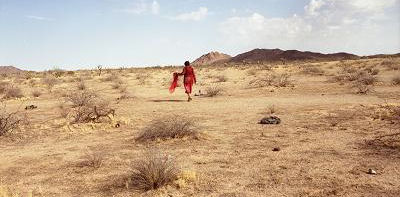Babel is Booming
Alejando Gonzalez Innaritu’s Babel, which press-screened this morning, is, I believe, a lock to win the Palmes D’Or. Everyone seems to be feeling this, spreading it around. If it doesn’t win, fine — it’ll still be an incredibly vivid and brilliant film — but I’ll be greatly surprised.
Babel (Paramount Vantage, 10.6) is an incredibly shrewd work in the sense that it’s shaped in a way that keeps you fully absorbed, and yet gradually awakened to the fact that there’s a greater whole coming together than what is indicated by gathering sum of story and scenes.
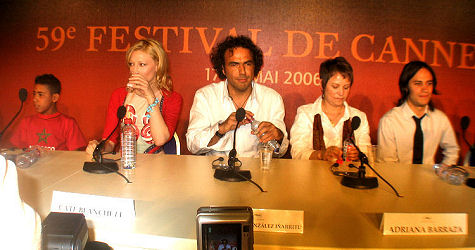
(l. to r.) Cate Blanchett, Alejandro Gonzalez Innaritu, Gael Garcia Bernal at this morning’s Babel press conference — 5.23.06, 11:33 am.
In the most rudimentary sense it’s a film about how one bullet out of a rifle causes damage and hurt to many people in various tangential roundabout ways. But it’s more deeply about how we’re all affected by everything and everyone…how no one is an island, we’re all in this together and everything we say or do echoes all over the place.
It’s about interconnectedness, aloneness, and human frailty, and is especially about parents and children. It radiates compassion and precision and refined artistry with every last frame, shot, edit and line of dialogue.
< ?php include ('/home/hollyw9/public_html/wired'); ?>
That last line sounds like breathless film-critic crap, so let’s go over the basics again…
Guillermo Ariagga’s script tells four stories that take place in three countries — Tunisia, Mexico and Japan — and several disparate characters (four played by Brad Pitt, Cate Blanchett, Gael Garcia Bernal and a young unknown Japanese actress, Rinko Yakusho).
The Tunisian section has two stories — that of a married American tourist couple (Pitt, Blanchett) and their encounter with a bullet, and a story about how that bullet is haphazardly fired from a long distance away by a pair of youths playing with a newly-purchased rifle, and about the consequences of this.
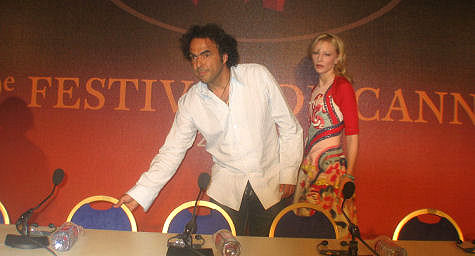
Innaritu, Blanchett as they entered the Salles de Presse inside the Palais this morning (5.23.060) at 11:25 am.
The Mexican section is about this couple’s nanny (Adriana Barraza) and her taking Pitt and Blanchett’s kids (Elle Fanning, Nathan Gamble) across the border into Mexico for a wedding, which leads to bad things all around, particularly for her nephew (Gael Garcia Bernal).
The Japanese portion is about the relationship between a wealthy businessman (Koji Yakusho) and his deaf daughter (Rinko Kikuchi), and the daughter’s encounters with various men, among them a visiting police detective.
They and many other are linked in the same way that the characters in Inarritu’s Amores Perros and 21 Grams are linked — by a single violent act.
This one of those “small” portraits of humanity writ large…and like I mentioned in my Inarritu interview a week and a half ago, it becomes larger and richer and more poignant the more you think about it.
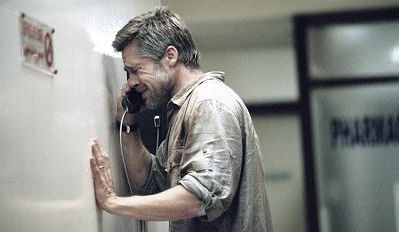
Some journalists in the post-screening press conference were asking Innaritu, “So…what’s it all about, really?” That plus the hearty applause and whoo-whoos from the press at the end of the screening tells me it’s one of those film that resonates in a way that’s fuller and deeper than any concisely worded “meaning” or “explanation.”
Innaritu answered by saying the film “has no lesson — I don’t do films to give lessons. It is a film about human beings…not Moroccans, not Mexicans, not Japanese, not Americans. It’s not about what separates us, but what binds us.”
The teeming energy before the packed press conference began, and the respectful applause given to each player when they were announced at the press conference got underway…you can just feel that this film has connected in a big way.
“The connections between the characters [in Babel] are not about coincidence,” Innaritu went on. “What makes us happy varies with each culture, with each person, but what makes us sad and miserable is something that everyone knows and shares.

“I can say the film is about incommunication, misunderstanding and loneliness,” Inarritu said in an interview we did on 5.5, or about eighteen days ago.
“But for me, the bottom line DNA of this film is about how fragile and vulnerable we are. How do you say, this is a chain, this is a little piece of the chain? A link? For me when a link is broken then the chain is broken. And that, for me, is what this film is about.
“Babel was an idea I had when I first arrived in the United States,” he recalled. “This film would have been impossible without me being a director in exile, I would say. Because what comes from this is that you have a consciousness…a very strange perspective of your country and of yourself.
“I’m speaking of a complex relationship between a citizen of a Third World country” — Inarritu was born, raised and launched his career in Mexico — “and this country, and the traveling that I have done in the last six years, the way you understand things. So I guess that was what [led] to the necessity of making this film.
“So I started working on this thing with Carlos Cuaron [the brother of Alfonso Cuaron and screenwriter of Y Tu Mama Tambien]. In the beginning. He would be the writer. But we began it as an argument and never took it beyond that, so we decided that he would do another project that we were developing.
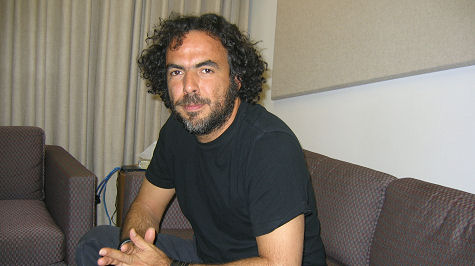
Babel director Alejandro Gonzalez Innaritu during interview at CBS Radford — Wednesday, 5.3.06, 1:10 pm.
“At this point I invited Guillermo to participate in this story, and we obviously…as part of that process, we decided to share a lot of things.”
“I think Babel is different from Amores perros and 21 Grams because the range of this film is completely different, style-wise, than the other ones. Because every story has a particular narrative and personality, and I feel that this is a more cinematic piece.
“I tried to combine the realistic aesthetic that normally I have been working in, but qualitating from an imaginary world where the music and the sound is a guiding force. There are a lot of sound elements in Babel. I was really taking the audio seriously. Using it to try and be inside a character.
“I stripped down so many things in the script by myself, and I was constantly adjusting and adapting and rewriting a lot of things based upon the culture and the situation I was in. It was a very difficult and informative process.
“I feel it is a very different film from the other ones in tone and style. It’s more cinematic. I can only put only one line in the script, but in the shooting I can make a ten-minute piece out of a whole interior consciousness [trip] by one of the characters.
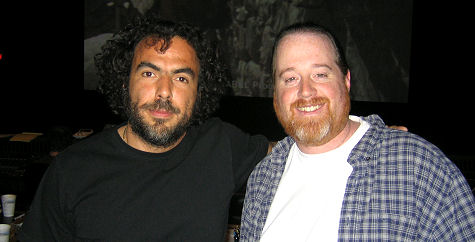
Inarritu, Babel editor Stephen Mirrione — Wednesday, 5.3.06, 1:17 pm
“I had to make a lot of decisions. In a good way. I added some things, and I also took out some things. I was shaping a lot and learning a lot and learning the limitations of the actors. So in the end I took out like 30% of the script down, in the editing. So there have been a lot of changes.
“We shot in Morocco, and then pre-production in Mexico, and then we shot in Mexico, and then over to Japan for pre-production and then we shot there. It was the same as doing four separate films, which was intellectually and emotionally very difficult. To shoot something in Morocco and at the same time think about the likelihood that a scene would cut directly into a scene I know I will shoot in Japan seven or eight months later. It was an exercise.
“And it was such a struggle, about going or not going to Cannes,” he added. “But we finally decided that Cannes is a good platform for this kind of film. It’s a four-language film, a very personal film, a very complicated film, and this festival exists for that…for this kind of film.
